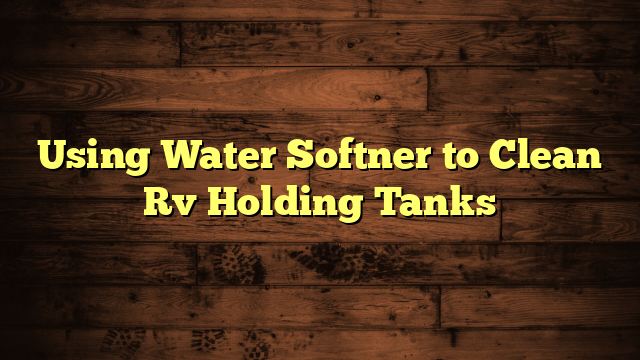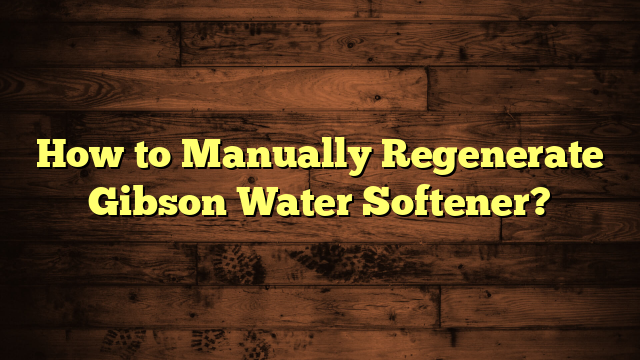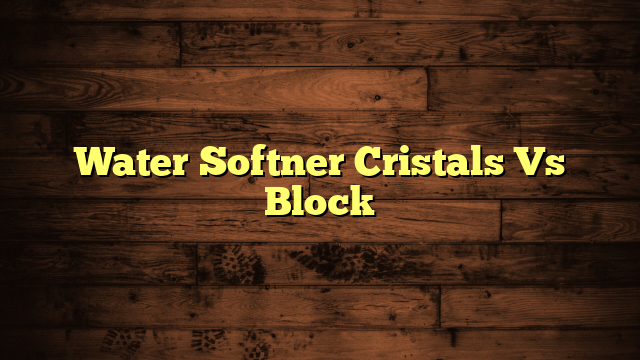Using Water Softner to Clean Rv Holding Tanks
Did you know that nearly 85% of U.S. households have hard water, which can lead to significant maintenance issues in RV holding tanks? Using a water softener can change that by minimizing mineral buildup and enhancing your cleaning efforts. By understanding how softened water interacts with your tanks, you can improve their longevity and efficiency. But what are the best practices for integrating a water softener into your RV maintenance routine? Let's explore the benefits and strategies that can keep your RV in top shape.
Key Takeaways
- Use softened water in RV holding tanks to reduce mineral buildup and enhance cleaning effectiveness.
- Incorporate specialized tank cleaners alongside softened water for improved maintenance results.
- Regularly check and maintain your water softener to ensure optimal performance during peak usage.
- Follow manufacturer guidelines to avoid damaging RV components and voiding warranties.
- Consult online forums and resources for community advice on effective cleaning practices.
Understanding Water Softeners
Understanding water softeners is essential for maintaining the cleanliness of your RV's holding tanks. If you've ever encountered water hardness, you know how pesky it can be. Hard water contains minerals like calcium and magnesium, which can build up in your tank, leading to clogs and odors. That's where the softening process comes in.
Water softeners work by exchanging these hard minerals for sodium ions, effectively reducing water hardness. This exchange happens in a resin bed, where hard water passes through and the minerals are trapped. As a result, you get softer water that's less likely to cause buildup in your RV's plumbing and tanks.
Using a water softener isn't just about convenience; it's about protecting your investment. By incorporating softened water into your cleaning routine, you're likely to extend the lifespan of your holding tanks and plumbing systems.
Plus, it makes cleaning easier, as soaps and detergents work more effectively with soft water. So, it's a win-win situation. By understanding how water softeners operate, you're better equipped to keep your RV in top shape.
Benefits for RV Holding Tanks
Using a water softener for your RV holding tanks offers several key benefits that can enhance your overall camping experience.
First and foremost, it improves tank maintenance. Hard water can lead to mineral buildup, which clogs pipes and tanks, making your cleaning efforts less effective. By using a water softener, you can reduce this buildup, ensuring your tanks function properly for longer.
In addition, water softeners can improve your cleaning techniques. Softened water allows for better soap and cleaning product effectiveness, making it easier to remove stubborn waste residues. This means you'll spend less time scrubbing and more time enjoying your trip.
Moreover, using softened water can help prevent unpleasant odors that often arise from stagnant waste in holding tanks. By keeping your tanks cleaner, you create a more pleasant environment inside your RV, which is essential for a good camping experience.
Lastly, regular use of a water softener can extend the life of your RV's plumbing system.
Choosing the Right Water Softener
Selecting the right water softener for your RV is key to maximizing the benefits you've just learned about. Consider the salt types and flow rates that best fit your needs. Choosing a softener that suits your RV's specific requirements can make a significant difference in cleaning efficiency.
Here's a helpful comparison of water softener options:
| Softener Type | Flow Rate (GPM) |
|---|---|
| Ion Exchange | 5-10 |
| Salt-Free | 2-5 |
| Magnetic | 1-3 |
When evaluating softeners, pay attention to the flow rate. A higher flow rate guarantees that your system can handle the demands of your RV, especially during peak usage times. Furthermore, consider the salt types that are compatible with your chosen softener. Some models work best with sodium chloride, while others may require potassium chloride.
How to Use Water Softeners
To effectively use a water softener in your RV, start by confirming it's properly installed and connected to your fresh water supply.
Once that's done, you can choose from various water softener types based on your needs. Portable units are great for RVs, while built-in systems can offer convenience.
Next, when you're ready to clean your holding tanks, use the correct cleaning techniques.
Begin by filling your tanks with softened water, which helps reduce mineral buildup. Add a specialized tank cleaner to enhance the softening effect.
After a few hours, it's time to flush the tanks thoroughly. Run fresh water through the system to wash away any loosened debris and residues.
Make sure to empty and rinse the tanks multiple times if you're dealing with stubborn buildup.
Finally, always check your water softener's maintenance needs, like salt levels or resin regeneration, to keep it working efficiently.
Regularly using a water softener can improve your RV's plumbing system, making trips smoother and more enjoyable.
Additional Cleaning Tips
Cleaning your RV holding tanks can be made even more effective with a few additional tips. First, consider using tank additives specifically designed for RV systems. These products can break down waste and odors, making your cleaning efforts more efficient. It's a good practice to add these additives regularly, especially after pumping your tanks, to keep everything fresh.
Next, pay attention to your cleaning frequency. Regular maintenance will prevent buildup and make each cleaning session easier. Ideally, aim to clean your tanks every few weeks, depending on usage. If you're on an extended trip, consider cleaning more often, as this will help maintain ideal tank performance.
Don't forget to flush your tanks thoroughly after adding water softener and any cleaning agents. This will guarantee that all residues are cleared out, preventing clogs and unpleasant odors.
Finally, always check your tank levels before starting a trip. Keeping an eye on these levels can save you from unpleasant surprises down the road.
Maintenance of Holding Tanks
Regular maintenance of your RV holding tanks is crucial for keeping them in ideal condition throughout your travels. To guarantee effective tank sanitation, you should regularly check and clean your tanks, preventing buildup that can lead to unpleasant odors and clogs.
Start by flushing your tanks with fresh water after each use to remove waste and residues. This simple step greatly aids in waste management and prolongs the life of your tanks.
Consider using a water softener during your cleaning routines. It helps break down waste more effectively, making it easier to flush away. Furthermore, using tank treatments designed for RVs can enhance sanitation, keeping bacteria and odors at bay.
Don't forget to inspect hoses and connections for any leaks or wear. Tighten fittings and replace damaged parts promptly.
Regularly empty and clean your black and gray water tanks to prevent issues down the line. By staying proactive, you'll not only maintain your RV's holding tanks but also guarantee a more pleasant and hassle-free travel experience.
Common Mistakes to Avoid
When cleaning your RV holding tanks, it's easy to make a few common mistakes that can lead to bigger problems.
Overusing water softener can actually create more issues than it solves, and ignoring the manufacturer's guidelines can put your system at risk.
Let's explore these pitfalls to guarantee you keep your tanks in top shape.
Overusing Water Softener
Many RV owners unknowingly overuse water softeners, leading to potential issues in their holding tanks. While these products can help prevent mineral buildup, excessive use can result in water softener overuse, which leads to excessive chemical buildup. This buildup can create a host of problems, including clogs and unpleasant odors in your tanks.
When you're cleaning your RV holding tanks, it's essential to use the right amount of water softener. More isn't always better; in fact, using too much can disrupt the delicate balance of your tank's environment. You might think you're doing a good job by adding extra, but this can backfire, causing you more headaches down the line.
To avoid these pitfalls, measure your water softener according to the recommended guidelines and observe how your tanks react. If you notice any signs of buildup or clogs, reconsider your cleaning routine.
Ignoring Manufacturer Guidelines
Ignoring manufacturer guidelines can lead to significant issues with your RV holding tanks. Each RV is designed differently, and the manufacturer recommendations are there for a reason. If you decide to use cleaning products that aren't approved, you might risk damaging your tanks or even voiding your warranty.
It's crucial to read the owner's manual before diving into your cleaning routine.
When using water softeners or any cleaning products, stick to what the manufacturer suggests. Some products might contain harsh chemicals that can corrode sensitive components in your RV. Furthermore, using too much water softener can create a buildup that clogs your tanks, leading to costly repairs.
To avoid these pitfalls, invest time in understanding your RV's specific needs. If you're unsure about a cleaning product, consult online forums or reach out to the manufacturer directly. They can provide insights into safe options that align with their recommendations.
Frequently Asked Questions
Can I Use Water Softener in My Rv's Fresh Water Tank?
You can use water softener in your RV's fresh water tank, but be cautious. Regular tank maintenance is essential. Always check manufacturer guidelines to guarantee it won't affect your plumbing or water quality negatively.
How Often Should I Clean RV Holding Tanks With Water Softener?
Cleaning your RV holding tanks is like spring cleaning your home; it keeps everything fresh. You should aim for every few weeks, adjusting based on usage. Consistent tank maintenance guarantees a smooth, odor-free experience on the road.
Are There Any Risks of Using Water Softener in RV Tanks?
When using a water softener, you should consider potential risks like buildup in pipes or equipment damage. Always follow safety precautions, including proper dilution and maintenance, to guarantee your RV's systems remain functional and safe.
Will Water Softener Affect My Rv's Plumbing and Fixtures?
You'll want to tread lightly here; water softeners can impact plumbing compatibility and fixture longevity. They might cause scale buildup in some systems, so check your RV's manual before diving into using one.
Can I Combine Water Softener With Other Cleaning Products?
You can combine water softener with other cleaning products, but check for product compatibility first. Mixing may enhance cleaning effectiveness, but avoid combinations that could create harmful reactions. Always read labels and follow manufacturer instructions.
Conclusion
Incorporating a water softener into your RV maintenance routine can dramatically change your experience on the road. Imagine gliding down a scenic highway, free from the worries of clogs and foul odors lurking in your holding tanks. By choosing the right softener and following best practices, you're not just preserving your RV's systems; you're enhancing every adventure. So, as you prepare for your next trip, remember: a little preparation goes a long way in keeping your journey smooth and enjoyable.







